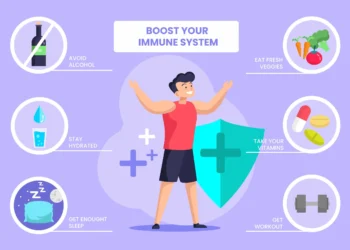Healthy food is the foundation for physical, mental and emotional wellbeing. Getting a well-balanced diet with enough of the right nutrients is not only a lifestyle but a necessity to achieve well-being and health. So let us talk about the many perks of healthy eating and how it affects every part of our lives.
Table of Contents
Physical Health Benefits

The biggest obvious benefit of eating well is that it plays an important role in health. A diet that is filled with fruits, vegetables, whole grains, lean protein, and healthy fats, gives the body all of the nutrients it needs to thrive. High-nutrient foods provide vitamins, minerals and antioxidants to bolster the immune system and prevent chronic diseases like diabetes, heart disease and cancer. For instance, berries and leafy greens are packed with antioxidants, which prevent the oxidative stress that causes ageing and illness.
Eating properly is part of healthy weight management too. Having lots of nutritious low-calorie food will prevent you from getting hungry and overeating. When you avoid processed foods that contain high levels of added sugars and unhealthy fats, you can lessen your risk of obesity and its complications including high blood pressure and joint diseases. Further, good nutrition nourishes the digestive system by delivering sufficient fibre, which helps keep the bowels moving and avoid problems such as constipation and irritable bowel syndrome.
Mental Health and Cognitive Benefits
It’s all about brains and the mental aspects of nutrition. The omega-3 fatty acids found in fatty fish, walnuts, and flaxseeds provide the cognitive health support that is necessary to prevent neurodegenerative disorders such as Alzheimer’s. Further, whole grains and complex carbohydrates deliver an uninterrupted supply of glucose to the brain that increases concentration, memory and cognitive function.
Well-balanced eating is also associated with better mood and reduced symptoms of mental health disorders such as depression and anxiety. Magnesium-rich foods like spinach, nuts and dark chocolate are known to decrease stress and make you feel relaxed. Likewise, fermented foods such as yoghurt and kimchi promote gut health, now known as a major predictor of mental health due to its gut-brain connection. A healthy gut microbiota can lead to improved emotional well-being and resilience.
Energy and Productivity
A balanced diet is essential to keep energy and work capacity up throughout the day. Energy-rich foods supply the fuel that your body requires to do physical and mental functions. For instance, proteins from eggs, chicken, and legumes repair tissues and create muscles; and carbohydrates from whole grains and fruits give us the energy that we need in our daily lives.
Eating properly can also enhance sleep quality — the key to energy and productivity. Tryptophan-containing foods, including turkey, bananas and oats, stimulate the release of serotonin and melatonin, which control sleep. A well-rested night ensures that people can rise with an eager mind and the confidence to conquer the day in a way that helps them perform better in both their personal and professional lives.
Long-Term Disease Prevention
One of the best advantages of good eating is that it helps to avoid chronic diseases. Consuming a balanced diet of fruits, vegetables and whole grains gives us vital nutrients that guard against chronic diseases. For example, fibre in whole grains reduces cholesterol and keeps you from getting heart disease. Banana and sweet potato potassium helps keep blood pressure in check, as well, so you won’t get hypertension.
Type 2 diabetes is also prevented by good nutrition. Lower glycemic foods like legumes and whole grains balance your blood sugar and increase your insulin response. Additionally, the anti-inflammatory nature of omega-3 fatty acids and antioxidants fight inflammation, which is a major driver of chronic illnesses such as arthritis and certain cancers.
Enhanced Longevity
Healthy eating is directly associated with a longer lifespan. Research has consistently demonstrated that people who eat a varied diet of plant-based foods, lean proteins, and healthy fats can live longer, healthier lives. The Mediterranean diet, for instance, which focuses on whole foods, olive oil and small amounts of wine, leads to lower mortality rates.
Good nutrition also fights age-related illnesses such as osteoporosis and macular degeneration. Milk products and plant milks are full of calcium and vitamin D that support bones and avoid breakage, and the antioxidants in brightly coloured fruits and vegetables protect eyesight and skin. As a result of promoting the body’s self-preservation, proper nutrition brings about smooth ageing and long-term well-being.
Social and Emotional Benefits
A good diet can help social and emotional wellbeing, too. Proper food in between family and friends reinforces the relationships. Sharing and cooking together leads to mindful eating and helps to make food more appetising and nutritionally rich.
Healthy food also improves self-esteem and body image. When we feed our bodies with nutritious food, we are also more happy with the way we look. This type of self-esteem can lead to mental well-being and a better quality of life.
Environmental Impact
More than personal, wholesome eating is good for the environment. When you eat sustainable, plant-based foods, your food production costs will be reduced. For example, by eating locally grown fruits and vegetables you minimise transport emissions and meat consumption saves water and cuts greenhouse gas emissions. If we eat in accordance with our environmental commitments, we are making the world a healthier place.
Practical Tips for Healthy Eating
Healthy eating doesn’t have to be complicated or time-consuming. The practical guidance for starting:
- Focus on Whole Foods: Get started on foods that are minimally processed, like raw fruits, vegetables, whole grains, and low-fat protein.
- Prepare Meals: Preparing meals in advance ensures access to healthy foods while preventing the temptation to make unhealthy decisions.
- Keep Hydrated: Hydration promotes digestion, energy, and health.
- Control Your Portion Size: Taking the proper portions helps in weight loss, and prevents you from overeating.
- Reduce Sugar and Salt: Consuming less sugar and salt lowers your risk of chronic diseases such as diabetes and hypertension.
- Understand Your Body: Don’t eat blindly but listen to your body’s signs of fullness and hunger.
Through these practices, healthy eating can become a long-term and pleasurable aspect of one’s life.
A diet is a weapon which makes you more physically, mentally and emotionally healthy. In terms of disease prevention, energy and extending life expectancy, there is no more important nutrition than a balanced diet. If we’re mindful of what we eat, and do our best to take a nutritional strategy that works for all of us, we can live healthier lives. And nutritious diets don’t only look after us – they heal the world. And if you take the time to eat well, you are investing not only in yourself but in our future as a species.












